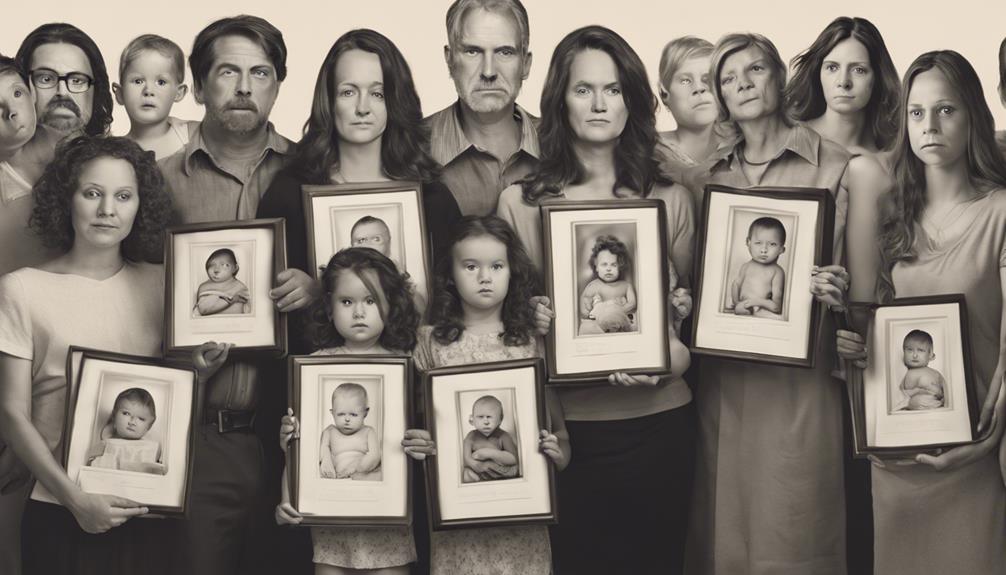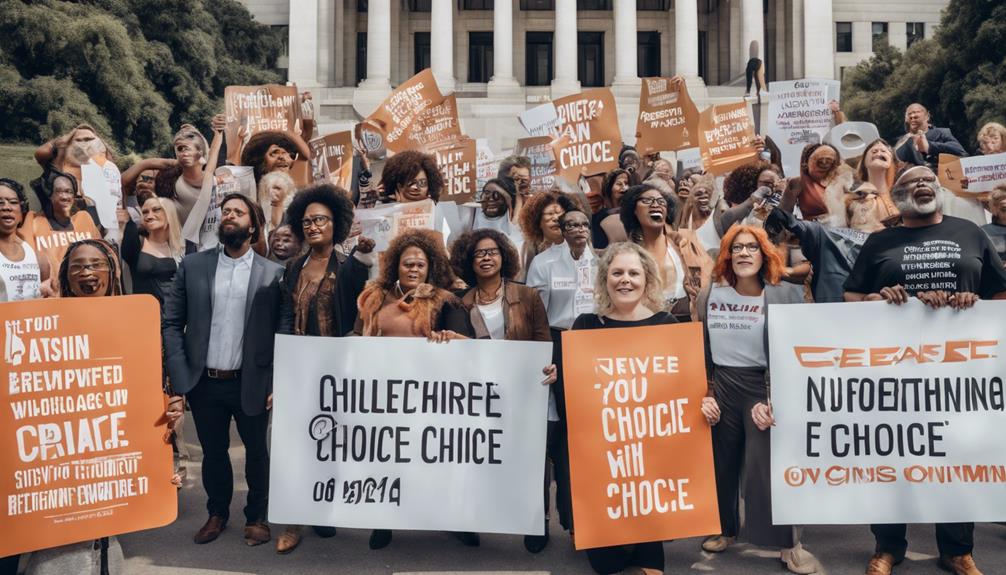Being voluntarily childfree involves a thoughtful choice to forgo parenthood based on personal preferences. But have you ever wondered about the complexities and nuances that shape this decision?
From societal pressures to self-discovery, the journey to embracing a childfree lifestyle is multifaceted and worth exploring.
Let's unravel the layers of this intriguing topic together, shedding light on the diverse reasons and experiences of those who choose to be voluntarily childfree.
Key Takeaways
- Choosing voluntary childfree lifestyle prioritizes personal growth and autonomy.
- Embracing childfree living offers freedom, flexibility, and independence.
- Challenges include societal pressures, stigma, and the need for resilience.
- Advocacy and support networks empower childfree individuals in navigating societal norms.
Reasons for Voluntarily Childfree Choice
In choosing to be voluntarily childfree, we often prioritize personal growth and autonomy over traditional family expectations.
The decision to embrace a childfree life can stem from various reasons, each deeply personal and valid. Some of us may feel a strong reluctance to pass on abusive genes, recognizing the importance of breaking harmful cycles.
For others, the desire for continuous personal development and self-improvement takes precedence over the responsibilities of child-rearing. The fear of long-term commitments and doubts about our parenting abilities also play a significant role in our voluntarily childfree choice.
Additionally, economic factors such as the high cost of living and stagnant wages can further solidify our decision to remain childfree. In a world where modern welfare programs diminish the necessity for children and the support for working women remains lacking, opting to be voluntarily childfree becomes a thoughtful and deliberate choice that aligns with our values and aspirations.
Challenges Faced by Childfree Individuals

Facing societal pressures and judgment, childfree individuals navigate a path filled with challenges and misconceptions. From family gatherings to casual conversations, childfree people often find themselves defending their choice in a world where parenthood is seen as the norm. The societal pressures to conform to traditional expectations of having children can be overwhelming, leading to feelings of isolation and alienation.
Gender disparities play a significant role in exacerbating these challenges, with women bearing the brunt of judgment and stigma for choosing to be childfree. Society often equates a woman's worth with her ability to become a mother, perpetuating the misconception that motherhood is the ultimate fulfillment for women. This skewed perspective not only undermines the autonomy of childfree women but also contributes to the stigmatization of their decision.
Navigating these challenges requires resilience and a strong sense of self-awareness. Childfree individuals must learn to set boundaries, educate others about their choice, and cultivate a supportive community that respects their decision to live a childfree lifestyle.
Benefits of Embracing Childfree Lifestyle
Navigating societal pressures and misconceptions, embracing a childfree lifestyle offers us higher levels of personal freedom, flexibility, and independence. Without the responsibilities of raising children, we've the liberty to shape our lives according to our desires and ambitions.
One significant advantage of this lifestyle is the surplus of disposable income that childfree individuals often enjoy. This extra financial flexibility allows us to invest in personal pursuits, travel the world, indulge in hobbies, or focus on advancing our careers.
The absence of parental duties not only frees up our time but also alleviates the stress associated with raising children. By choosing to be childfree, we can prioritize self-care, mental well-being, and nurturing relationships with our partners, friends, and family. Embracing a childfree lifestyle enables us to focus on our own goals and aspirations, without the constraints of parenthood.
Ultimately, the decision to be childfree empowers us to lead lives that are fulfilling and aligned with our personal values.
Societal Attitudes Towards Childlessness

We face societal stigmas that label childlessness as abnormal, often placing pressure on us to conform to traditional family structures. Expectations regarding family size can lead to misunderstandings and strained relationships with those who don't comprehend our choices.
The impact of societal attitudes on our personal lives and connections is profound and often challenging.
Social Stigma Surrounding Childlessness
Despite increasing acceptance, negative societal attitudes towards childlessness persist, often subjecting voluntarily childless individuals to judgment and criticism for their decision. These attitudes can create societal struggles, as childfree individuals may feel pressured to conform to traditional family expectations.
Stigmas and stereotypes surrounding childlessness can lead to misunderstandings and strained social interactions. Cultural norms heavily influence the stigmatization of the childfree, perpetuating misconceptions and societal pressures.
It's essential to recognize the diverse reasons individuals choose to be childfree and to foster understanding and acceptance within society. By challenging these negative attitudes and promoting empathy and respect, we can create a more inclusive environment where individuals feel empowered to make choices that align with their values and aspirations.
Expectations on Family Size
When considering societal attitudes towards childlessness, it's evident that expectations on family size play a significant role in shaping perceptions and experiences of voluntarily childfree individuals.
In a world where the global population continues to rise, choosing to be childfree can be met with societal pressures and misunderstandings. The traditional view that parenthood is a natural and expected milestone can create challenges for those who opt out.
Cultural norms around family size can contribute to the stigmatization of being childfree, adding to the misconceptions and judgment faced by individuals who make this decision. Navigating these expectations on family size can be a significant aspect of the journey for those who've deliberately chosen to be childfree.
Impact on Relationships
Societal attitudes towards childlessness often cast judgment, criticism, and misunderstanding upon voluntarily childfree individuals, impacting their relationships and interactions within their communities.
- Voluntarily childfree individuals face societal pressure to conform to traditional family norms.
- Misconceptions about childlessness can strain relationships with family and friends.
- Negative stereotypes surrounding childfree choices may lead to feelings of isolation.
- Women especially encounter heightened scrutiny and judgment for not having children, affecting their sense of belonging in society.
Stigmatization of the Voluntarily Childfree

As voluntarily childfree individuals, we often encounter social pressures and misconceptions that challenge our personal decisions and autonomy. These stigmas can impact our relationships with family, friends, and society, leading to feelings of judgment and scrutiny.
It's crucial to address the stigmatization we face and advocate for acceptance and understanding of our choice to remain childfree.
Social Pressures and Misconceptions
Frequently faced with societal questioning and moral outrage, voluntarily childfree individuals navigate through a landscape marked by misconceptions and stigmas. Despite progress, negative attitudes towards childlessness persist, posing challenges for those who choose not to have children.
- Societal Questioning: Constantly bombarded with inquiries about their decision, childfree individuals often feel pressured to justify their personal choices.
- Misconceptions: Assumptions of future regret, selfishness, and loneliness plague the voluntarily childfree, perpetuating stereotypes that are far from the truth.
- Gender Disparities: Women bear a heavier burden of judgment for choosing a childfree life, facing heightened scrutiny due to societal expectations surrounding motherhood.
- Stigma: Despite increasing acceptance, negative societal attitudes towards childlessness persist, creating a challenging environment for voluntarily childfree individuals to navigate.
Personal Decisions and Autonomy
Navigating through a landscape marked by misconceptions and stigmas, voluntarily childfree individuals assert their personal decisions and autonomy in the face of societal pressures and judgment. Our choice to be childfree is deeply personal, rooted in our autonomy to decide what path is best for us.
Despite societal stigmatization, we stand firm in our belief that parenthood isn't a mandatory life goal. The pressure and moral outrage we encounter only strengthen our resolve to live authentically. Cultural norms often fail to consider the diverse reasons behind our decision, leading to misunderstandings and judgment.
As childfree individuals, we navigate a world where our personal decisions are scrutinized, yet we remain steadfast in our autonomy to choose our own path.
Impact on Relationships
Voluntarily childfree individuals often find themselves grappling with societal stigmas and judgment within their relationships due to their decision not to have children. These stigmas can create challenges in fostering acceptance and understanding among family, friends, and romantic partners. The pressure to conform to traditional family structures may strain relationships, leading to misunderstandings and tension.
Below are four ways in which the stigmatization of the voluntarily childfree impacts relationships:
- Society's expectations of parenthood can create strained interactions.
- The voluntarily childfree may face pressure to conform to traditional family structures.
- Stigmatization can lead to misunderstandings with those who prioritize parenthood.
- Finding acceptance and support within social circles and romantic relationships may be challenging.
Political Activism and Support Organizations

Support organizations and political activist groups play a crucial role in advocating for the rights and choices of childfree individuals. For voluntarily childless individuals like us, these childfree advocates and support organizations, such as No Kidding!, provide a sense of community and valuable resources. They challenge societal norms, offer education, and foster a feeling of belonging within the childfree community.
Political activism in this movement focuses on crucial issues like reproductive rights, family planning choices, and the broader acceptance of our lifestyle decisions. Through these support networks, we've a platform to connect with like-minded individuals, share our experiences, and collectively advocate for our right to choose a childfree life.
These organizations serve as pillars of support, empowering us to navigate a society that often misunderstands or stigmatizes our decision to be voluntarily childfree.
Frequently Asked Questions
What Is Voluntary Childlessness?
Voluntary childlessness is the intentional choice not to have kids. It's a decision made based on personal reasons like lifestyle and career goals.
People who are childfree prioritize personal freedom over traditional family roles. It's essential to understand that this choice doesn't define a person's worth.
Society's opinions on this decision can vary. Some may not understand or even criticize it, while others believe in respecting individual choices.
What Is a Voluntary Decision to Not Have Children?
We've made a choice not to have kids. It's a decision we've actively made based on our personal values and preferences.
We prioritize things like our careers, relationships, and personal goals. This deliberate choice allows us to focus on what matters most to us.
What Does It Mean to Be Childfree?
Choosing to be childfree means embracing a lifestyle without children. It's a decision based on personal values, goals, and desires rather than societal expectations. For many, the childfree lifestyle in society represents an opportunity to pursue other passions, career goals, or a life full of experiences that may otherwise be limited by the responsibilities of parenthood. This choice challenges traditional norms and opens up conversations about the diversity of fulfilling life paths available to individuals. Ultimately, it reflects the growing acceptance of personal autonomy and the right to live in a way that aligns with one’s own vision of happiness.
This choice empowers us to prioritize our own happiness, career, and relationships. Being childfree doesn't define our worth; it reflects our intentional decision-making process and freedom to shape our lives according to our preferences.
It's about respecting diverse family planning choices and living authentically.
What Is the Regret Rate for Childfree People?
We've found that the regret rate for childfree individuals is quite low, with only a small percentage expressing any remorse over their decision. Most of us are content and fulfilled in our childfree lifestyle, embracing the freedom, financial stability, and career opportunities that come with it.
Research suggests that around 5-10% of childfree individuals experience regret, indicating that the vast majority of us are happy with our choice.
Conclusion
In conclusion, being voluntarily childfree is like choosing a different path in a forest full of well-trodden trails. It may not be the most popular choice, but it allows us to navigate our own journey, free from societal expectations.
Despite facing challenges and stigma, embracing this lifestyle offers freedom, personal growth, and the opportunity to define our own happiness.
Let's continue to support and respect all family planning choices, including the decision to be childfree.









